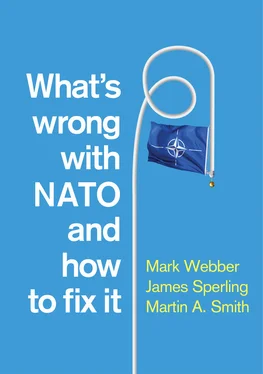What’s Wrong with NATO and How to Fix It
MARK WEBBER, JAMES SPERLING AND MARTIN A. SMITH
polity
Copyright © Mark Webber, James Sperling and Martin A. Smith 2021
The right of Mark Webber, James Sperling and Martin A. Smith to be identified as Authors of this Work has been asserted in accordance with the UK Copyright, Designs and Patents Act 1988.
First published in 2021 by Polity Press
Polity Press
65 Bridge Street
Cambridge CB2 1UR, UK
Polity Press
101 Station Landing
Suite 300
Medford, MA 02155, USA
All rights reserved. Except for the quotation of short passages for the purpose of criticism and review, no part of this publication may be reproduced, stored in a retrieval system or transmitted, in any form or by any means, electronic, mechanical, photocopying, recording or otherwise, without the prior permission of the publisher.
ISBN-13: 978-0-7456-8265-5
A catalogue record for this book is available from the British Library.
Library of Congress Cataloging-in-Publication Data
Names: Webber, Mark, author. | Sperling, James, author. | Smith, Martin A., author.
Title: What’s wrong with NATO and how to fix it / Mark Webber, James Sperling and Martin A. Smith h.
Other titles: What is wrong with North Atlantic Treaty Organization and how to fix it
Description: Medford : Polity Press, 2021. | Series: What’s wrong? | Includes bibliographical references and index. | Summary: “A penetrating diagnostic of the world’s most powerful military alliance”-- Provided by publisher.
Identifiers: LCCN 2020038353 (print) | LCCN 2020038354 (ebook) | ISBN 9780745682617 (Hardback) | ISBN 9780745682624 (Paperback) | ISBN 9780745682655 (ePub)
Subjects: LCSH: North Atlantic Treaty Organization. | European Union. | National security--European Union countries. | European Union countries--Foreign relations.
Classification: LCC UA646.3 .W433 2021 (print) | LCC UA646.3 (ebook) | DDC 355/.031091821--dc23
LC record available at https://lccn.loc.gov/2020038353LC ebook record available at https://lccn.loc.gov/2020038354
The publisher has used its best endeavours to ensure that the URLs for external websites referred to in this book are correct and active at the time of going to press. However, the publisher has no responsibility for the websites and can make no guarantee that a site will remain live or that the content is or will remain appropriate.
Every effort has been made to trace all copyright holders, but if any have been overlooked the publisher will be pleased to include any necessary credits in any subsequent reprint or edition.
For further information on Polity, visit our website: politybooks.com
Preface and Acknowledgements
Writing on matters of contemporary importance always faces the challenge of relevance. How will a book’s analysis and proposals stand up as events carry on regardless of the authors’ prognostications? This is a question we asked ourselves many times as this volume progressed. A book originally conceived in 2013 has had to take on board the Ukraine crisis of 2014; the election of Donald Trump in 2016; Brexit; a major reconfiguration of NATO’s mission in Afghanistan; and the worsening of political order to NATO’s south in the Middle East and North Africa. The manuscript had been drafted by early 2020 with all these events accommodated. Then came the COVID-19 pandemic. For some, this is an event of such magnitude that it amounts to a ‘year zero’ in international politics. If that judgement were true, much of our analysis would have become instantly redundant. It would be like finishing a book on terrorism the week before 9/11. But such a view may well prove false. This is not to minimize the ghastly and extensive effects of COVID-19. Pandemics, by definition are grave, but history suggests that they are also often temporary. Public health interventions, vaccines and acquired immunity could well mean that within a few years the disease is but ‘a disturbing memory’. 1Equally, as Joseph Nye has suggested, the pandemic ‘might not change the world’. 2This may seem a hopelessly optimistic view from the vantage point of November 2020, as COVID-19 marches across the globe. But Nye’s point is a sensible one. The big issue of global politics – the rise of China and America’s adjustment to it – will play out regardless. Equally, NATO’s perennial issues – the ones that have structured this book – will remain. To ignore COVID-19 would, however, have been perverse. In finishing the book, we have thus taken into consideration the evolving landscape of international response, but we have not been deflected from retaining a structure for the book that talks to NATO’s longer-standing issues – those that pre-date the COVID-19 crisis and those that will outlast it. In short, we have dealt with the pandemic as an important, but second-order, issue (the book’s concluding chapter explains how and why). Our thanks are owed here to one external reader who suggested that the pandemic could best be conceived as ‘magnifying’ but not replacing ‘existing trends and fault lines’ facing the Alliance.
Getting the book over the finishing line in such turbulent times owes much to the forbearance of Louise Knight and Inès Boxman at Polity. Their patience in the face of more than one delay in the book’s delivery is much appreciated. The final push was also made possible by the generosity of the University of Birmingham, which afforded Mark Webber an extended sabbatical to complete the writing and editing. In addition, we would like to acknowledge a range of friends, colleagues and interlocutors, all of whom have fed ideas into the analyses (perhaps sometimes unwittingly). Thanks are owed to Derek Averre, Wyn Bowen, Lawrence Chalmer, Malcolm Chalmers, Lorenzo Cladi, Fabrizio Coticchia, Albert Covelli, Adam Crawford, John Deni, David Dunn, Spyros Economides, Nico Faso, Trine Flockhart, Rita Floyd, Alex Garrido, Tim Haughton, Ben Kienzle, David Logan, Sonia Lucarelli, Jennifer Medcalf, Hugo Meijer, Philip Mizen, Alex Moens, Jaimie Orr, Jack Porter, Patrick Porter, Adam Quinn, Jens Ringsmose, Sten Rynning, Jamie Shea, Thierry Tardy, Keery Walker, Nick Wheeler, Richard Whitman, Ben Wilkinson, Michael J. Williams and Katharine Wright. This book sits alongside others published by Polity addressing the question of What’s Wrong with international organizations. Two of these were of some influence in shaping our thinking. We would thus like to thank Simon Hix and Thomas Weiss for their insights on, respectively, the European Union and the United Nations. If these have been transposed wrongly to NATO in any way, the responsibility is ours not theirs.
Finally, a personal note. The book was finalized during what historians might one day refer to as the age of social distancing and lockdown. This meant a lot of time spent with friends and family as homes became offices, and deadlines merged with domestic schedules. The deferred gratification that attends any writing project was intensified in these circumstances. Our thanks are, therefore, owed to Eddie, Della, Joy, Theo, Sheila and Victoria.
Mark Webber, James Sperling and Martin A. Smith November 2020
1 1. Tom Clark, ‘The Contagion Effect’, Prospect, May 2020, p. 1.
2 2. Joseph S. Nye Jr, ‘COVID-19 Might Not Change the World’, Foreign Policy, 9 October 2020, https://foreignpolicy.com/2020/10/09/covid-19-might-not-change-the-world/.
ACOAllied Command OperationsACTAllied Command TransformationAGSAlliance Ground SurveillanceAMFAllied Command Europe Mobile ForceASEANAssociation of Southeast Asian NationsAWACSairborne warning and control systemBMDballistic missile defenceCARDCoordinated Annual Review on DefenceCDPSPThe Current Digest of the Post-Soviet PressCFEConventional Forces in EuropeCFIConnected Forces InitiativeCPGComprehensive Political GuidanceCSBMsConfidence and Security Building MeasuresCSCEConference on Security and Cooperation in EuropeCSDPCommon Security and Defence PolicyCTcounter-terrorismDCIDefence Capabilities InitiativeEDFEuropean Defence FundEDSTAREuropean Defence Standards Reference SystemeFPenhanced Forward PresenceESDIEuropean Security and Defence IdentityEUEuropean UnionEUCOM[US] European CommandEUGSEU Global StrategyFNCFramework Nations ConceptGPSGlobal Positioning SystemIISSInternational Institute for Strategic StudiesINFIntermediate-Range Nuclear ForcesISAFInternational Security Assistance ForceISRintelligence, surveillance and reconnaissanceISTARintelligence, surveillance, target acquisition and reconnaissanceJEFJoint Expeditionary ForceJISRjoint intelligence, surveillance and reconnaissanceKFORKosovo ForceMAPMembership Action PlanMARCOMMaritime CommandMENAMiddle East and North AfricaMETOMiddle East Treaty OrganizationMPCCMilitary Planning and Conduct CapabilityNATONorth Atlantic Treaty OrganizationNDPPNATO Defence Planning ProcessNNECNATO Network-Enabled CapabilitiesNORDEFCONordic Defence CooperationNRCNATO–Russia CouncilOAFOperation Allied ForceORSOperation Resolute SupportOSCEOrganization for Security and Cooperation in EuropeOUPOperation Unified ProtectorPESCOPermanent Structured CooperationPfPPartnership for PeacePJC[NATO–Russia] Permanent Joint CouncilSACStrategic Airlift CapabilitySACEURSupreme Allied Commander EuropeSALISStrategic Airlift International SolutionSATCOMsatellite communicationsSEATOSouth East Asia Treaty OrganizationSHAPESupreme Headquarters Allied Powers EuropeSIPRIStockholm International Peace Research InstituteSTANAGsstandardization agreementstFPTailored Forward PresenceUNUnited NationsUNCLOSUnited Nations Convention for the Law of the SeaVJTFVery High Readiness Joint Task ForceWHOWorld Health Organization
Читать дальше












